Registration hotline: (06)726-3353
Registration time:
Monday to Friday
08:00-12:00 am and 13:00-18:00 pm
Saturday
08:00-12:00 pm
Chi Mei Hospital, Chiali Patient Guide
Medical Treatment Process And Instructions
Registration method and time
On-site registration
| Morning Consultation | Afternoon Clinic | Evening clinic | |
|---|---|---|---|
| Draw a number card | 07:00 am | 13:00 pm | 17:00 pm |
| Start on-site registration (self-service registration machine and registration counter are carried out simultaneously) |
08:00 am | 13:30 pm | 17:30 pm |
Manual telephone (register/cancel)
Self-service registration/registration at the check-in machine
Registration time: 24 hours a day
Online Registration
Registration time: 24 hours a day
Chi Mei Medical System Mobile APP
Registration time: 24 hours a day
Website:
Website:
| Chi Mei Medical System Mobile APP QR code |
Chi Mei Medical System Mobile APP QR code |
|---|---|
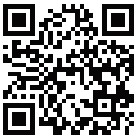 Provide Android phones Installation URL on Google Play |
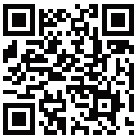 Provide iOS mobile phone Install URL in App Store |
Chi Mei Medical System LINE@奇醫管家
Registration time: 24 hours a day
LINE ID: @cmedline
LINE ID: @cmedline
| Chi Mei Medical System LINE@奇醫管家 QR code |
|---|
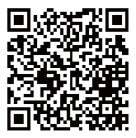 Scan the QR code/search ID to join friends |
Source: Medical Services Unit
Typhoon Suspension Notice
Adjust the outpatient service operation principles of our hospital
- Chi Mei Medical System will suspend operations according to the Tainan City Government's announcement. Outpatient services will be suspended. Emergency, hospitalization, surgery, examinations, health checks, and dialysis services will remain as usual.
- Appointments made during the Tainan City Office Suspension Period will be automatically cancelled and will not be recorded as no-shows. Please re-register . We apologize for the inconvenience.
- If you need to reschedule scheduled examinations, surgeries, or hospitalizations due to weather conditions, please contact the unit and phone number listed on the examination form.
Sincerely, Chi Mei Hospital
Source: Medical Services Unit
Service Hotline
The available consultation times are
Weekdays
08:00~12:00am and 13:00~17:00 pm
08:00~12:00am and 13:00~17:00 pm
| Unit | telephone |
|---|---|
| Representative Number (Switchboard) (24 hours) | (06)726-3333 |
| Drug consultation (24 hours) | (06)726-3333 ext. 33112 |
| Service Desk | (06)726-3333 ext. 32111 |
| Registration Hotline | (06)726-3353 (Specialist) |
| Referral Center | (06)726-3333 ext. 32119 |
| Suggestion/Complaint Hotline | (06)726-3333 ext. 32921 |
| Health Checkup Center | (06)726-3333 ext. 37520 |
| Department of Social Welfare | (06)726-3333 ext. 32133 or 32134 |
| Apply for the long-term chronic and home care hotline (discharge preparation service) | (06)726-3333 ext. 33062 |
| Photocopy medical records | (06)726-3333 ext. 32252 (daytime) (06)726-3333 ext. 32251 (nighttime) |
| Smoking cessation consultation hotline | (06)726-3333 ext. 33269 |
| Consultation status enquiry | (06)726-3333 ext. 32111 |
| Hospitalization and Discharge Service Center | (06)726-3333 ext. 32302~32303 |
| 1.Receipt application and fee inquiry 2.Occupational accident consultation |
Outpatient: (06)726-3333 ext. 32313~32314 Emergency: (06)726-3333 ext. 37171~37172 Inpatient: (06)726-3333 ext. 32302~32303 |
| Application for medical certificate | (06)726-3333 ext. 32305 |
| Disability Assessment Contact | (06)726-3333 ext. 32111 |
Source: Medical Services Unit
Outpatient medical treatment process
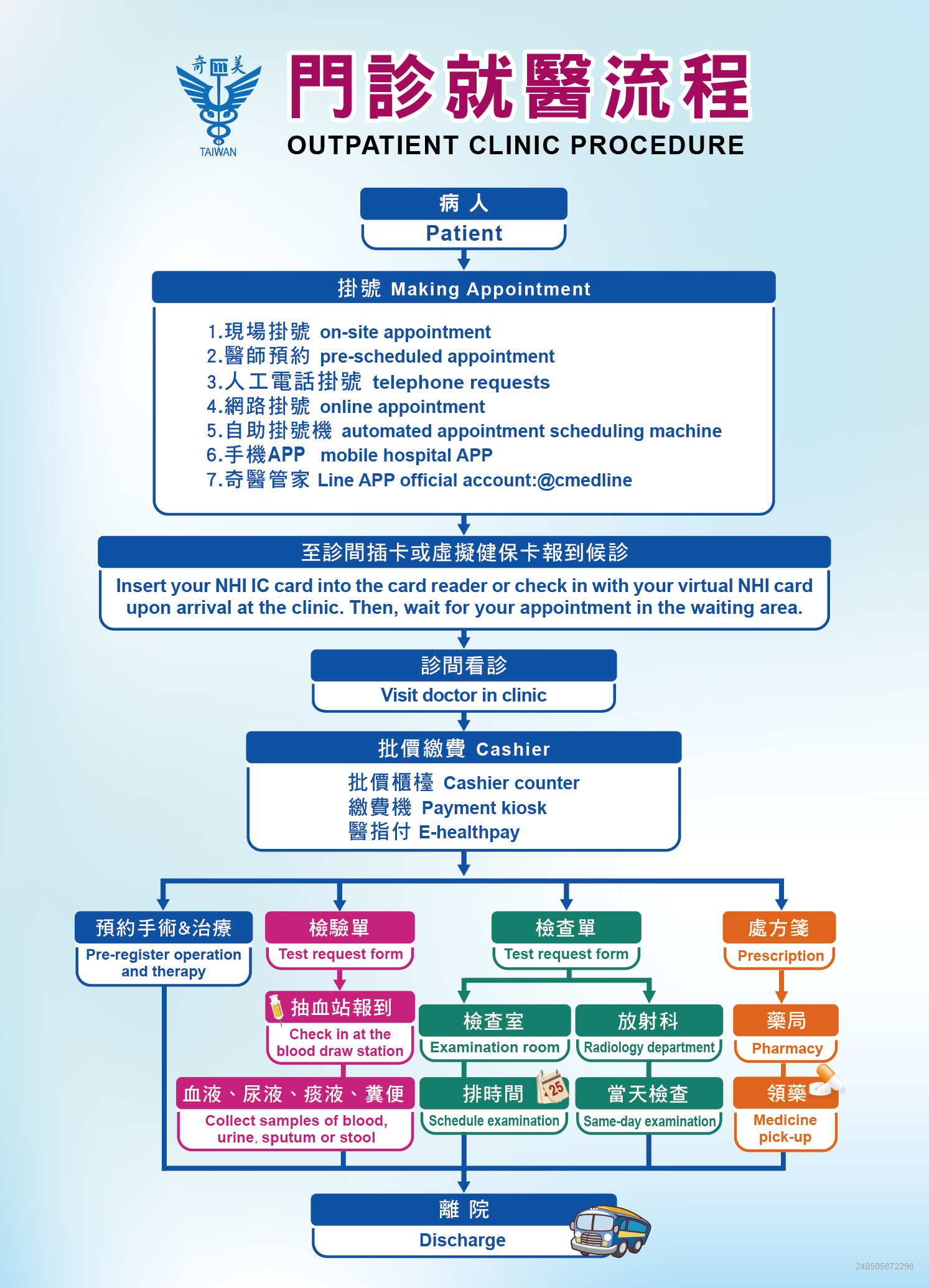
Source: Medical Services Unit
Emergency Procedure
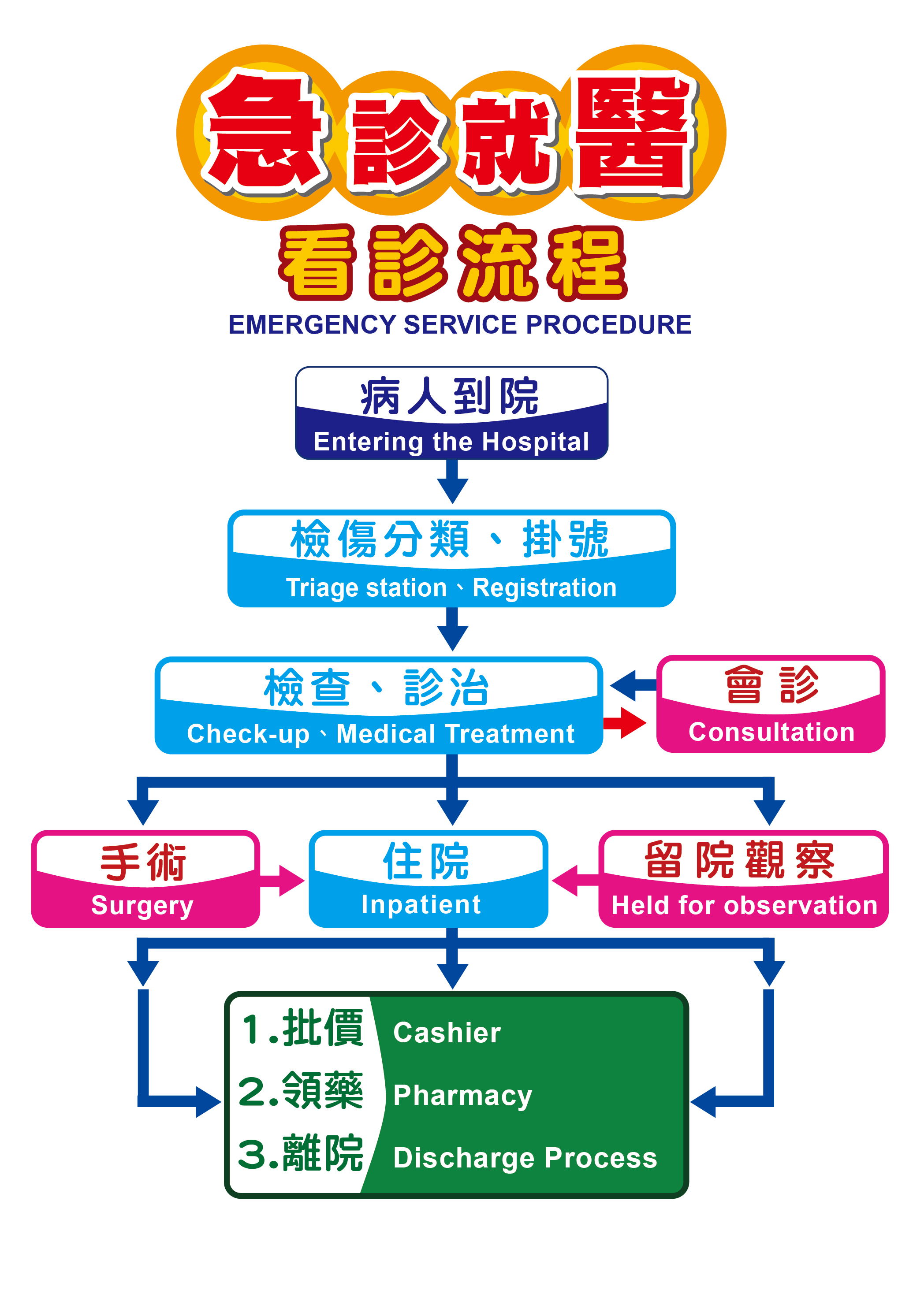
Referral Process
Referral Services
- Referral case acceptance and response.
- Transfer inspection and transfer inspection business.
- Insurance document inquiry case acceptance.
Source: Medical Services Unit
Outpatient Referral Process
To serve referral and examination patients, please bring your referral form directly to the referral center on the first floor of our hospital for arrangement.
- Service hours:
Monday to Friday 08:00-17:00
Saturday 08:00-12:00 - Referral center telephone number:
(06)726-3333 ext. 32119 or 32111
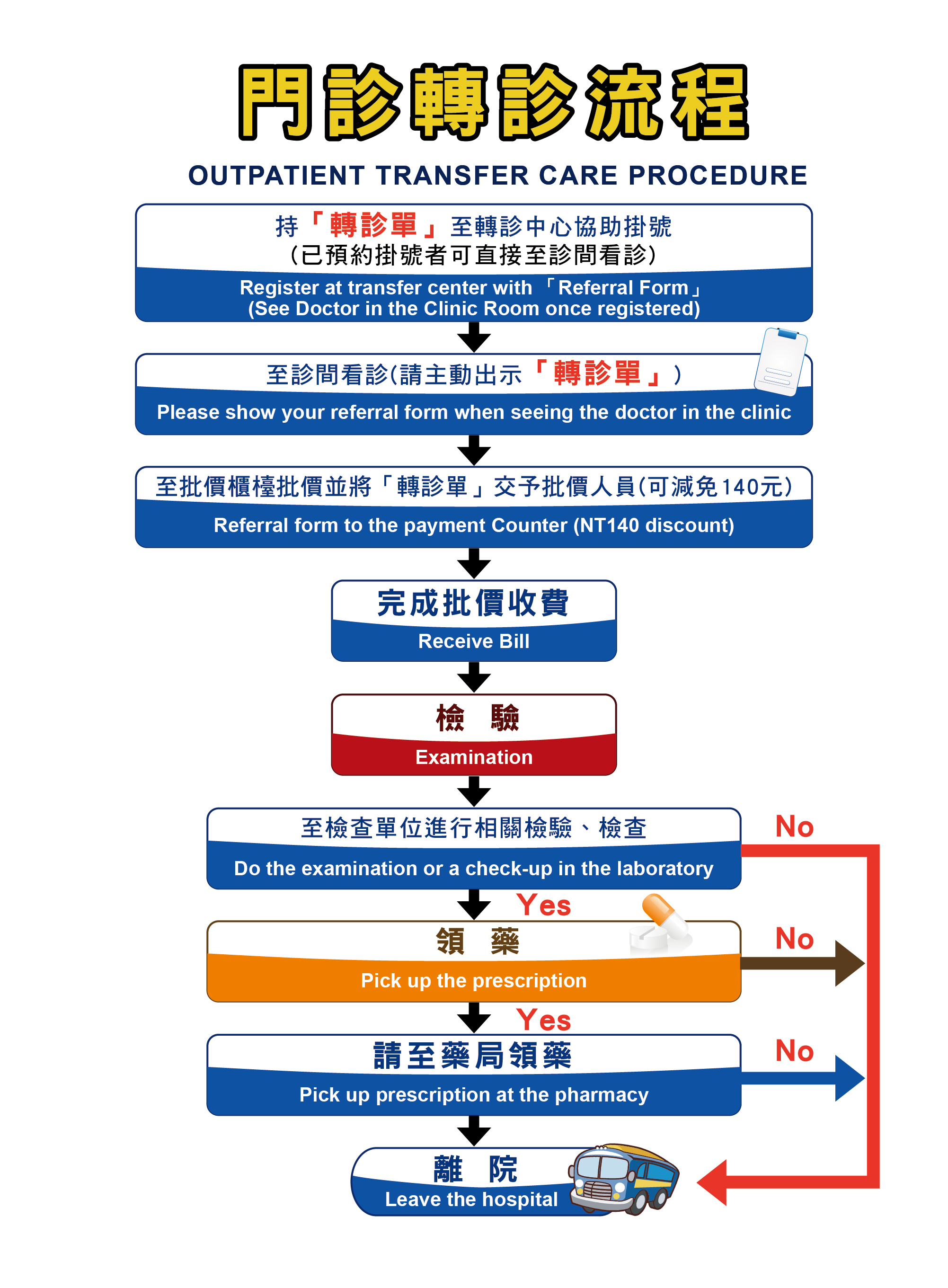
Source: Medical Services Unit
Emergency Referral Process
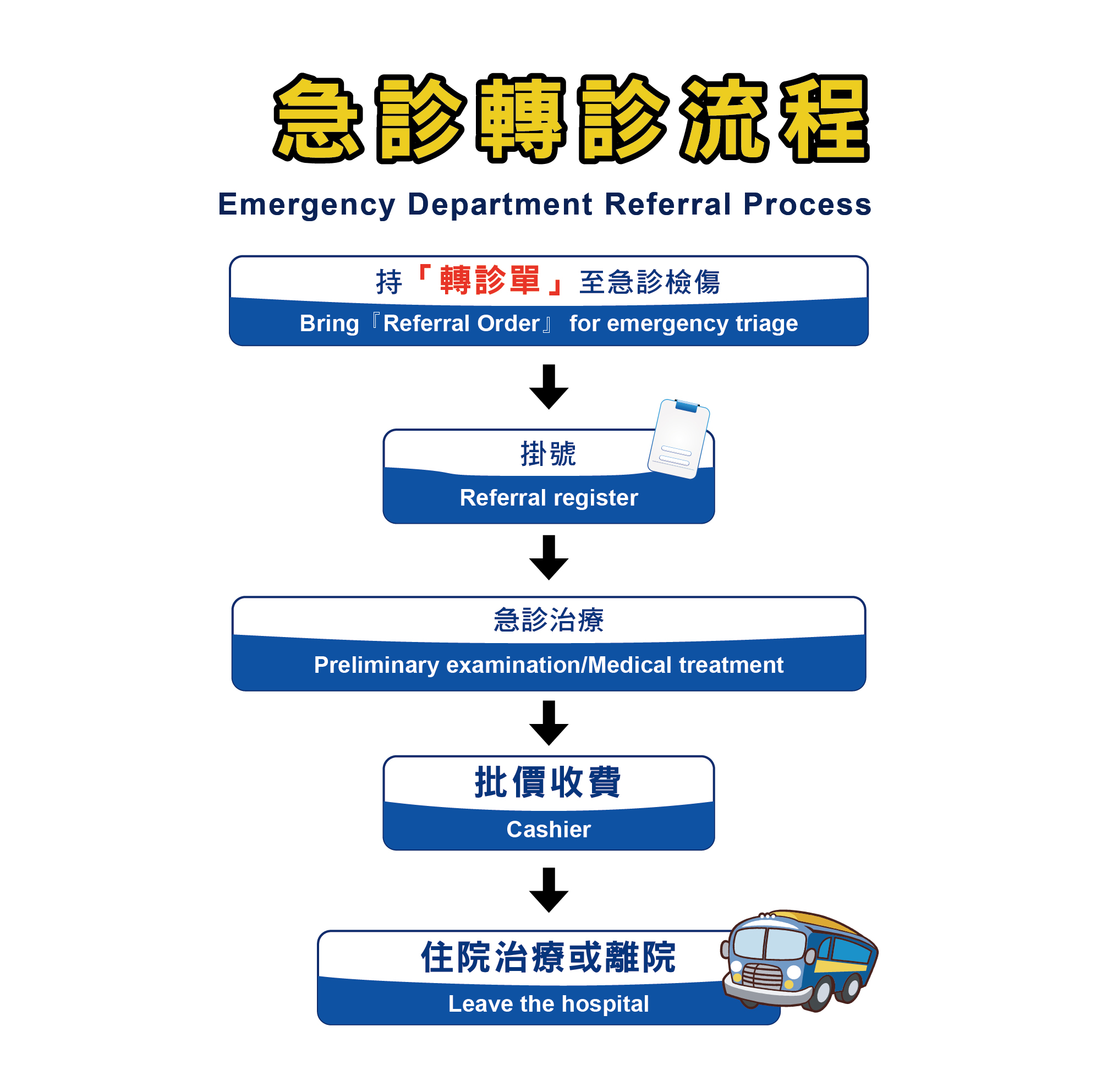
Source: Medical Services Unit
Transfer Process
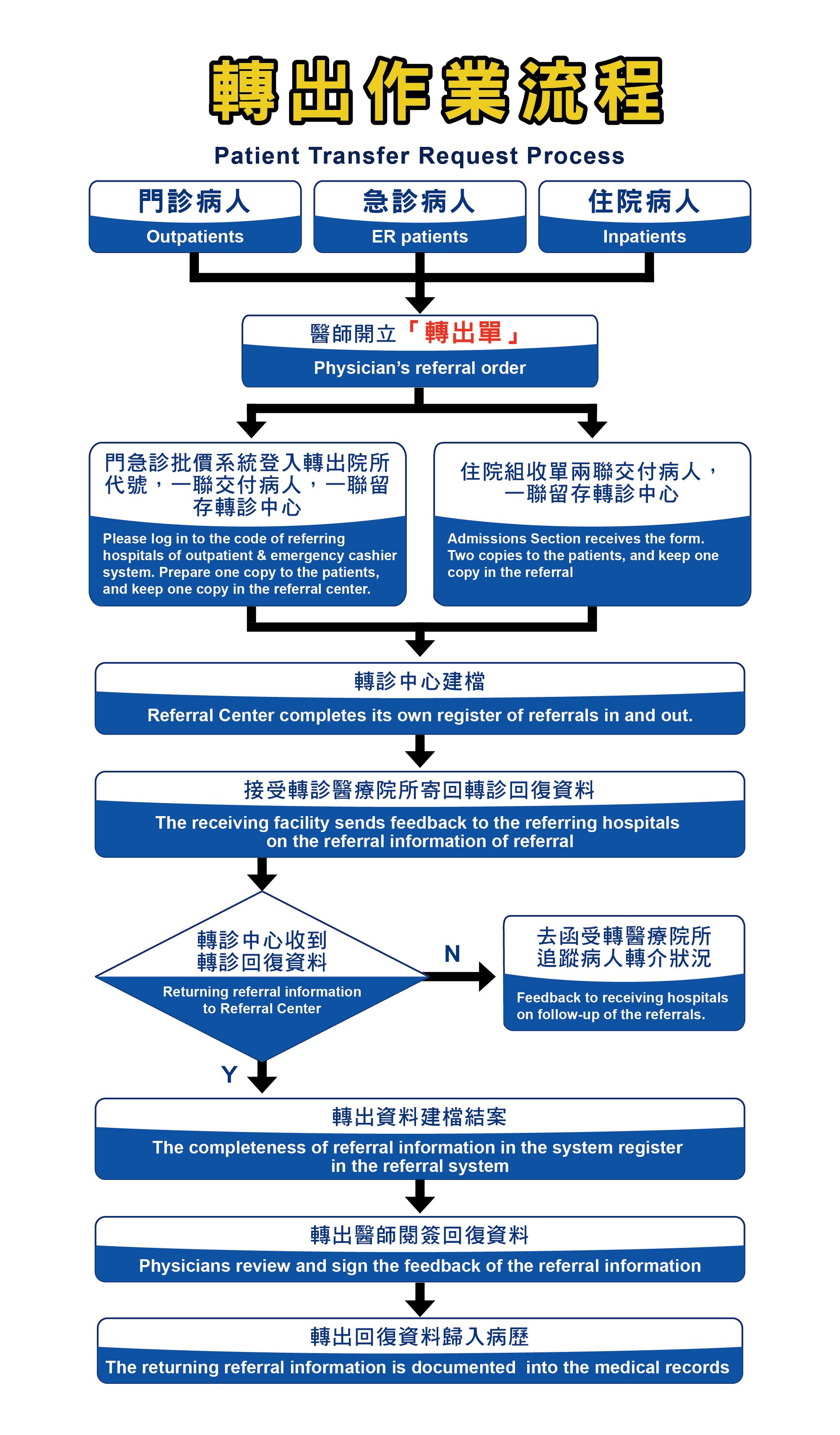
Source: Medical Services Unit
Hospitalization procedures and bed waiting instructions
- Those who are diagnosed by doctors as needing hospitalization should go to the hospitalization service counter on the first floor (windows 8 and 9) with the "hospitalization permit" issued by the doctor to complete the hospitalization procedures. (Please go to the counter at window 7 on the first floor during off-hours)
- Fill out the "Hospitalization Consent Form".
- Health insurance patients please attach:
- Health Insurance IC Card
- Identity card
- Labor Insurance occupational accident certificate.
Note:- If you do not have complete documents, please first apply for hospitalization as a self-funded patient and complete the documents within three days before changing your status.
- In accordance with health insurance regulations, you will need to use your health insurance card for related examinations, consultations, etc. during hospitalization. Please be sure to bring your health insurance card with you when you check out.
- For other preferential status, please present relevant certification documents when you are hospitalized.
- Bed assignment or registration.
- Outpatient waiting list:
- Wait for a phone call on the day of hospitalization, then report to the hospital service counter at the agreed time after receiving the call.
- If you fail to arrive for hospitalization on time and do not contact us in advance, we will not be able to reserve a bed for you.
- If the beds are full, the patient will be re-assigned the next day.
- Those who hold the routine examination form for outpatient and inpatient treatment, please complete the relevant examinations and tests.
- Report to the ward under the guidance of volunteers or specialists.
- Patients waiting for beds in the hospital: If you need to adjust the ward level, please go to the nursing station on that floor to register for bed transfer.
- Emergency patients waiting for beds: hospitalization will be arranged according to the current bed arrangements.
- Our hospital does not accept registration for designated inpatient beds (except for single bed, double bed difference ward or health insurance bed hospitalization intention). Inpatient beds will be arranged according to medical needs and bed usage.
- If you have dialysis or rehabilitation treatment on the scheduled day of hospitalization, you must inform us in advance when registering for hospitalization. Please complete dialysis or rehabilitation treatment before reporting for hospitalization.
- If you are still taking Chinese medicine prescribed by the hospital, please bring it back and give it to the ward nurse when you check in for admission.
Hospitalization Procedure
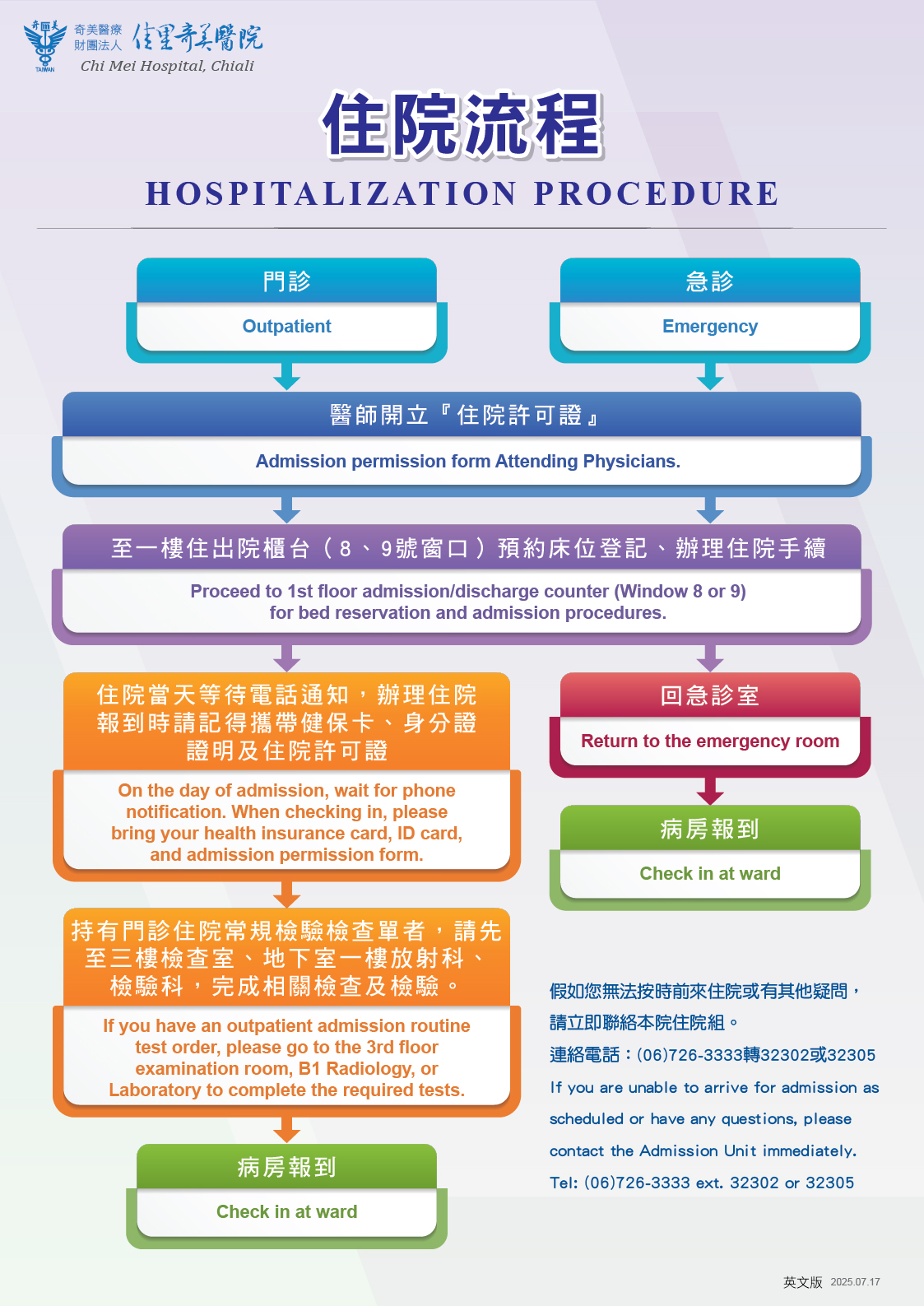
Meals
- Our hospital provides general meals (vegetarian). You can order meals from the nursing staff. Meals are served at the following times every day:
- In order to meet the needs of disease treatment, our hospital's nutritionists will prepare suitable special treatment diets (such as tube feeding, low-salt diet, diabetic diet, etc.) according to the patient's condition to ensure the patient's dietary safety. Our hospital regards therapeutic diets as medical treatment and hopes that patients will cooperate with ordering meals (such as diabetes, chronic renal failure, etc.).
| Breakfast: 07:00-08:00 | Lunch: 11:30-12:30 | Dinner: 16:30-17:30 |
Fee Description
- Hospitalization charges are calculated from the time the hospitalization procedures are completed, and the difference in room charges will be handled similarly.
- The NHI ward fee payment is limited to insured wards. If you voluntarily stay in a super-class ward, you must pay the difference in ward fees.
- The daily deductible for a Super Class Room is as follows:
- Our hospital's wards are all acute wards. According to the regulations of the National Health Insurance Administration, patients must pay part of the expenses as follows:
- Meal fee explanation:
- The insured person should pay for special medical equipment, medicines or personal hygiene supplies processing materials of NT$500 per day in the intensive care unit that are not covered by the National Health Insurance (you can bring your own), and for patients admitted to the respiratory care unit, they should pay for patient living care expenses of NT$800 per day or NT$23,000 per month.
- If a general patient is temporarily admitted to a respiratory isolation ward, the charge standard will be the same as that for a double ward. If a respiratory isolation patient needs to be admitted due to medical conditions, he/she should cooperate in being transferred to other wards.
- When discharged from a deficit ward, a late fee of $500 will be charged if the check-out is made after 12:00 noon.
- After hospitalization, you can go to the hospitalization team to make a prepayment, and the excess will be refunded or supplemented when you are discharged.
- Medical expense receipts can be included as deductions in the annual comprehensive income tax return. Please keep the receipts properly.
| Ward level | Health Insurance Status Copayment |
Self-funded status |
|---|---|---|
| Single Room | NT$3,000 | NT$3,532 |
| Double Room | NT$1,200 | NT$1,732 |
| General Health Room | No subsidy difference | NT$532 |
| Number of days hospitalized | Partially borne | |
|---|---|---|
| Expense ratio | Maximum limit | |
| 1-30 days | 10% | According to the announcement of the National Health Insurance Administration |
| 31-60 days | 20% | No upper limit |
| More than 61 days | 30% | No upper limit |
| Dinner | Meals | Treatment / General | Price (Daily) |
|---|---|---|---|
| Regular Meals | 3. Meals | generally | 240 NTD |
| Therapeutic Meals | 3 meals 3 snacks |
treatment | 250 NTD |
| Full flow, thick porridge | 3 meals 3 snacks |
Treatment + Isolation | 240 NTD |
| Semi-fluid | 3 meals 3 snacks |
treatment | 250 NTD |
| Half-portion six meals | 3 meals 3 snacks |
treatment | 250 NTD |
| generally | 200 NTD | ||
| Half-portion meals | 3 Meals | treatment | 180 NTD |
| generally | 150 NTD |
Instructions on how to pay medical expenses
Cash Payment (Over the Counter)
Please bring your "Discharge Notice" to the Inpatient Department counter on the first floor to pay.
- Not subject to the transfer limit of NT$30,000
- Operation instructions: Please select a CITIC Bank ATM with payment function
- Insert your bank card.
- Select "Payment".
- Enter your password.
- Select "Payment".
- Enter the payment amount.
- Enter your bank code "822" (China Trust).
- Enter payment account number "95776+medical record number (8 digits)" (13 digits in total).
- Confirm the payment account and payment amount.
- Transaction completed.
- After completing the payment, please keep the transaction details and go to the Inpatient Department Counter to process your discharge.
- There is a ChinaTrust ATM next to Elevator A2 on the first floor of our hospital. No transaction fee is required when using ChinaTrust Bank debit cards. However, cards from other banks are subject to inter-bank transaction fees.
Postal Allocation
- You can bring cash to any post office in Taiwan to make a transfer (handling fees will be charged according to the regulations of each bank):
Fill in the account number field on the transfer form 「31597873」- Fill in the payment amount
- Fill in the recipient name field "Chi Mei Medical Foundation Chi Mei Hospital in Jiali".
- Communication field notes "Patient's name, medical record number (or ID number)".
- After completing the payment, please keep the transfer receipt and go to the Inpatient Department Counter on the 1st floor to process your discharge.
Bank transfer
- You can go to any financial institution to fill out a remittance form (handling fees will be charged according to the regulations of each bank):
- Payee's name: Chi Mei Medical Foundation Chi Mei Hospital.
- Payee Account Number: Taiwan Bank, Tainan Branch 009-001-003324 or China Trust & Investment Tainan Branch 059-540-398087, please specify "Patient's name, medical record number (or ID number)" .
- After completing the payment, please keep the remittance receipt and go to the Inpatient Counter on the 1st floor to complete the discharge process.
Over-the-counter ATM (debit card payment)
- The debit card must have a “non-contractual” transfer function.
- Regardless of the amount, a bank handling fee of NT$10 is required for each transaction (no handling fee for those using Taiwan bank debit cards).
- The transaction and application functions of the card itself are determined by the issuing bank. Since the regulations of each financial institution are different, if you have any questions, please contact your issuing bank for enquiry.
Document Request
- Hospitalization Certificate: Please apply for the hospitalization certificate at the nursing station as early as possible before discharge. If you apply after discharge, you need to register at the outpatient clinic.
- Serious Injury or Illness: Please bring your serious injury or illness diagnosis and ID to the inpatient counter on the first floor of our hospital (windows 8 and 9) to apply for a serious injury or illness card.
- Death certificate
- Death due to illness: Death in this hospital shall be invoiced by the attending physician of this hospital.
- For patients who die at home with breathing and heartbeat before discharge, our hospital will not issue a death certificate but a general diagnosis certificate, which will be provided to the family for reference by the doctors at the health clinic.
- Deaths not caused by disease or suspected death not caused by disease: (including homicide, car accident, suicide, etc.)
- No hospital, clinic or health center may issue a death certificate. They can only issue a general diagnosis certificate and a forensic report. In addition, this hospital should report to the police station command center under the jurisdiction of this hospital in accordance with the provisions of the Tainan City Government Health Bureau's letter No. 1001023061 dated 12/1/2019.
- For those who died of non-morbidity or suspected non-morbidity, and died after discharge from hospital, a Type B diagnosis certificate will be issued to provide the family with the information for judicial autopsy. The family is requested to report the case to the police station and notify the procuratorate for autopsy in accordance with the law.
- Applicants and required documents
- The applicant must be himself or herself or his spouse, direct relative, collateral relative, in-law or other legal representative.
- When applying in person, please present your ID card for verification.
- If you are not the applicant, you must present the following three documents to apply:
- Patient’s ID card.
- Applicant’s ID card.
- Submit documents proving the relationship.
- After leaving hospital, those who wish to apply
- Please go to the outpatient registration desk to register for an outpatient consultation with your original physician or the attending physician of the department.
- When you are being treated by a doctor, please explain the purpose of your application to the doctor, who will then issue you a diagnosis.
- Take the prescription to the approval office for price and payment, then go to the admission (discharge) counter on the first floor (window 10) to get the printed diagnosis certificate.
- If the patient is still breathing and has a heartbeat before leaving our hospital, our hospital will provide a general diagnosis or medical record summary, which will be provided by the family to the doctor at the clinic for reference.
- Notes
- Do not ask a doctor to issue a diagnosis that is not true.
- If you are applying for a birth or death certificate or a previously issued diagnosis again, please submit a photocopy of the reissue application directly to the admission (discharge) counter (window 10) on the first floor of our hospital, and show the applicant's ID card and documents proving his/her relationship with the patient, and pay the fee directly.
- The certificate must be applied for by the patient himself, his legal representative or someone authorized by him.
Patient Rights Book
- Patients have the right to receive appropriate and respectful care and treatment, regardless of nationality, gender, race, age, religion, socioeconomic status or other factors.
- Patients have the right to be informed of their condition, medical options, and the possible effectiveness, risks, and prognosis of each option, and have the right to choose and decide on the medical options provided by doctors.
- Except for legal requirements and emergency situations, patients have the right to know the details before any examination or treatment begins, and decide whether to sign the relevant documents of informed consent before a specific examination or treatment. The above documents are completed by the patient on a "voluntary" basis.
- Patients have the right to refuse treatment within the limits permitted by law. When a patient refuses treatment, he or she also has the right to be informed of the consequences of refusing treatment.
- Patients have the right to exercise privacy in their treatment. All discussions, consultations, examinations and treatments are confidential and should be handled with care. Those who are not directly related to the patient's treatment must obtain the patient's consent to be present.
- Patients have the right to request that their medical information be kept confidential, properly and securely, and that their medical information be used only in compliance with legal provisions.
- Patients have the right to receive appropriate medical services from hospitals.
- When necessary, hospitals should provide assessment and referral; before referral, patients have the right to obtain the medical records and explanations they need.
- Patients diagnosed as terminally ill can choose hospice care and life-sustaining care options.
- A person with full capacity for conduct may sign an advance medical decision after advance medical care consultation and may withdraw or modify it in writing at any time.
- Patients who are invited to participate in hospital human trials or human research have the right to know the details in advance and have the right to refuse without affecting their medical rights.
- Patients have the right to request personal medical records, diagnosis certificates and medical expense statements and receive appropriate explanations.
- Patients have the right to know the hospital's rules and their rights. Patients can take the initiative to fight for their rights and not be ignored.
- If a patient has any dissatisfaction or suggestion about the medical treatment or related services provided by the hospital, he or she has the right to lodge a complaint with the hospital and receive a response.
Patient Responsibility Form
- Patients should proactively produce their medical voucher, national identification card or other documents sufficient to prove their identity.
- To ensure safety, patients have the responsibility to proactively provide medical staff with accurate health conditions, past medical history, allergy history, travel history and other relevant information.
- Patients have the responsibility to respect the professionalism of medical personnel and cherish medical resources. They should not ask medical personnel to provide false information, certification documents or exceed proper medical procedures.
- Patients are responsible for cooperating with the medical staff's instructions and suggestions and implementing all medical measures and related instructions agreed to by the patient or legal representative.
- Before signing a consent form or making a medical decision, patients should fully understand its content and possible outcomes of treatment.
- Patients and their families should be actively involved in deciding how their medical care is delivered, and they should not have unrealistic expectations about treatment outcomes.
- Patients are responsible for keeping their personal belongings safe and not bringing valuables to the hospital to protect their personal belongings.
- In order to maintain the overall safety of the hospital environment, it is prohibited to bring dangerous items and legally prohibited items into the hospital.
- To avoid infection, do not bring children into the ward unless necessary.
- To prevent infectious diseases and protect public health, pets should not be allowed into hospitals.
- Patients and their families are responsible for complying with the hospital's regulations regarding leave, access control, accompanying patients, and smoking bans while in the hospital.
- To maintain order and peace in the hospital and to protect the privacy of others and our staff, patients and their families should not record, videotape or take photos in the hospital.
- In order to maintain the medical rights of all patients and the safety of medical personnel, verbal or physical threats to or harming all relevant medical personnel in the hospital are prohibited.
- If you are a patient with "supervisory declaration" or "auxiliary declaration", you must proactively inform the clinical medical staff to avoid affecting your rights to medical treatment.
Ward Rules
- During the hospitalization period, the hospital will provide patients with special clothing, personal toiletries and daily necessities, and family members will need to use quilts, so please prepare them yourself.
- If you need to leave the ward for something, please remember to inform the nurse first. If you want to leave the hospital, you must first obtain the consent of the attending physician and sign the "Leave Certificate", which can not exceed 4 hours. If you leave the hospital without permission, the hospital will regard it as voluntary discharge.
- Patients need to have enough rest. Please work together to maintain peace in the ward. If someone makes a loud noise, please help to stop them or notify the nurse to handle it.
- After 9pm, only one relative or friend is allowed to accompany the patient. If a service staff is required to take care of the patient exclusively, please contact the nursing stations.
- To reduce the risk of infection, please ask relatives and friends to greet patients by phone whenever possible and avoid visiting patients. Children and the elderly are especially susceptible to infection and should avoid going to the hospital. When giving gifts, please avoid flowers and other high allergens.
- The ward is a semi-open space. Please do not bring valuables or excessive amounts of money during your hospitalization to ensure the safety of your belongings.
- Electricity safety regulations:
- To protect the safety of medical electrical equipment and prevent electrical hazards, the hospital prohibits the use of personal electrical equipment in public spaces or wards.
- If a person fails to comply with the hospital's electricity usage regulations, resulting in endangerment of medical treatment or a disaster, he or she will be held liable for relevant criminal and civil compensation.
- The hospital completely prohibits smoking, drug use and betel nut chewing. According to the regulations of the Ministry of Health and Welfare, if you smoke in the hospital and are reported, you will be fined NT$2,000 to NT$10,000.
- Pets are not allowed in the hospital.
- It is the duty of our hospital staff to provide you with good medical services. If you think that the medical staff have performed well, please encourage them, but please do not give them money or gifts, so as not to cause trouble to the service staff.
- Wireless Internet access is available in our single rooms.
- In order to protect the patients’ peace, safety and privacy during hospitalization, patients are requested to cooperate in rejecting any product promotion activities by outside sales personnel or notify nursing staff to avoid unnecessary disturbance.
- For the rest of the services and precautions provided by our hospital during hospitalization, please refer to the "General Hospitalization Instructions" posted at the door of each ward.
- If the bed needs to be adjusted according to medical needs during hospitalization, please cooperate with the hospital's bed transfer process.
- Our hospital implements garbage sorting on a comprehensive basis.
- Comply with the personal information law to ensure patient privacy. Please avoid using the phone to inquire about your condition. 〈Medical staff cannot confirm the identity of the other party on the phone〉
- To protect the medical treatment and personal safety of hospitalized patients, please do not bring dangerous items (such as knives, etc.) during hospitalization.
Pharmaceutical services
Outpatient and emergency patients
- Drug preparation.
- Medication advice services.
- Drug information provided.
- Diabetes medication guidance.
- The pharmacist explained the medicine on the spot.
Inpatients
- Drug preparation.
- Monitoring of drug concentrations in blood.
- Clinical pharmaceutical care in the intensive care unit.
- Clinical pharmaceutical care in infectious disease ward.
- Prevention and reporting of adverse drug reactions.
- Patient-controlled analgesia dispensing service.
Tips for Accompanying and Visiting Patients
- Accompanying patients and visitors who have diseases such as upper respiratory tract infection should wear masks and leave the hospital immediately or replace the accompanying person if necessary.
- It is not advisable to bring children, the elderly or pets to the hospital to visit or accompany the patient to protect the health of patients and visitors.
- Accompanying patients or visitors who bring flowers or other plants to the hospital should not leave them in the ward but take them home immediately.
- When treatment or examination is being performed in the patient's private area, visitors and companions are requested to temporarily leave the scene, draw the curtain and hang a "Do Not Enter During Treatment" sign to protect the patient's privacy.
- When helping the patient change clothes, the patient's companion should draw the curtain and ask visitors to leave the scene temporarily.
- Our hospital is limited to one person accompanying the patient. Visitors after 9pm and those accompanying the patient beyond the limit are requested to cooperate in leaving the hospital.
- Accompanying patients and visitors are strictly prohibited from bringing prohibited items such as cigarettes, alcohol, and illegal drugs for patients to use.
- Accompanying or visiting patients are strictly prohibited from the following behaviors
- Making loud noises or causing disturbances in the environment.
- Distributing leaflets or promotional items within the hospital.
- Acting as an intermediary within the hospital.
- Patient companions should comply with relevant matters
- The accompanying chairs in the health insurance and double wards are used during lunch breaks and nighttime sleep and should be folded up as seats at other times.
- After using the lunch boxes, please place the leftovers in the recycling bin in the pantry of each nursing station.
- After 10 pm, unless there is special treatment or the patient's condition allows, please help turn off the TV and lights. The bedside lamp and night light may be turned on according to the patient's needs.
- The hospital has access control hours from 10pm to 6am. Visitors must bring their accompanying pass when entering or leaving the hospital. Visitors without an accompanying pass must register.
- Patient companions must comply with the following infection control measures
- If you have or are suspected of having an upper respiratory tract infectious disease, you should leave the hospital immediately and change your companion.
- Each patient can only have one companion.
- The activities of the patient's companion are limited to the single ward where the patient is staying.
- Be sure to wash your hands before and after contact with patients to maintain personal and patient hygiene.
- Comply with the hospital’s quarantine regulations at all times.
- When changing the patient's bedding, avoid shaking it and place it in the dirty clothes bag immediately after changing.
- Waste generated by patients should be classified according to regulations.
- Any unfinished matters must be guided by the nurse.
- If the patient has a notifiable infectious disease, the patient’s companion and visitor must cooperate in registering the “Visitor and Accompanying Patient Record Form for Infectious Disease Cases”.
- Special Ward Visiting Hours
ICU Visting Hours
| Morning | Night |
|---|---|
| 11:00 ~ 11:30 (30 minutes) | 19:00 ~ 19:30 (30 minutes) |
Discharge Procedures
- When the doctor determines that your condition has stabilized or you have recovered and are ready to be discharged, the hospitalization fee will organize your information and the nursing station will give you a "discharge notice".
- Please bring your "discharge notice" to the admission/discharge counter (windows 8 and 9) on the first floor to pay the bill and get your health insurance IC card back. You must bring your medication with you when you are discharged from the hospital. After checkout, please bring your prescription to the pharmacy on the first floor to pick up your medication.
- If you need to collect the hospitalization certificate, please inform the nursing station and then go to the admission (discharge) counter on the first floor (window 10) to pay the fee and collect the diagnosis certificate.
- You can be discharged at your own will, but you cannot be discharged if the doctor believes that you have not recovered. According to the regulations (Article 75 of the Medical Law), you or your family should go through the "self-discharge" procedure. If you need to make a temporary payment at night or on holidays, the procedures are as follows: a temporary payment of NT$5,000 is required for hospitalization within three days, and a temporary payment of NT$10,000 is required for hospitalization for more than three days. After 10:00 am the next day, bring the temporary payment receipt to the hospital's 1st floor admission (discharge) counter (windows 1 and 2) to complete the formal checkout procedure.
- If you have received a discharge notice, please complete the discharge procedures and vacate the bed before 1:00 p.m. on the same day so that the bed can be cleaned and disinfected to allow the next inpatient to move into the ward as soon as possible.
- If your condition improves and the doctor diagnoses that you no longer need to stay in the hospital, the hospital will notify you to be discharged; if you do not leave the hospital after being diagnosed and notified, all expenses for continued hospitalization will be borne by you. (Article 53 of the National Health Insurance Act).
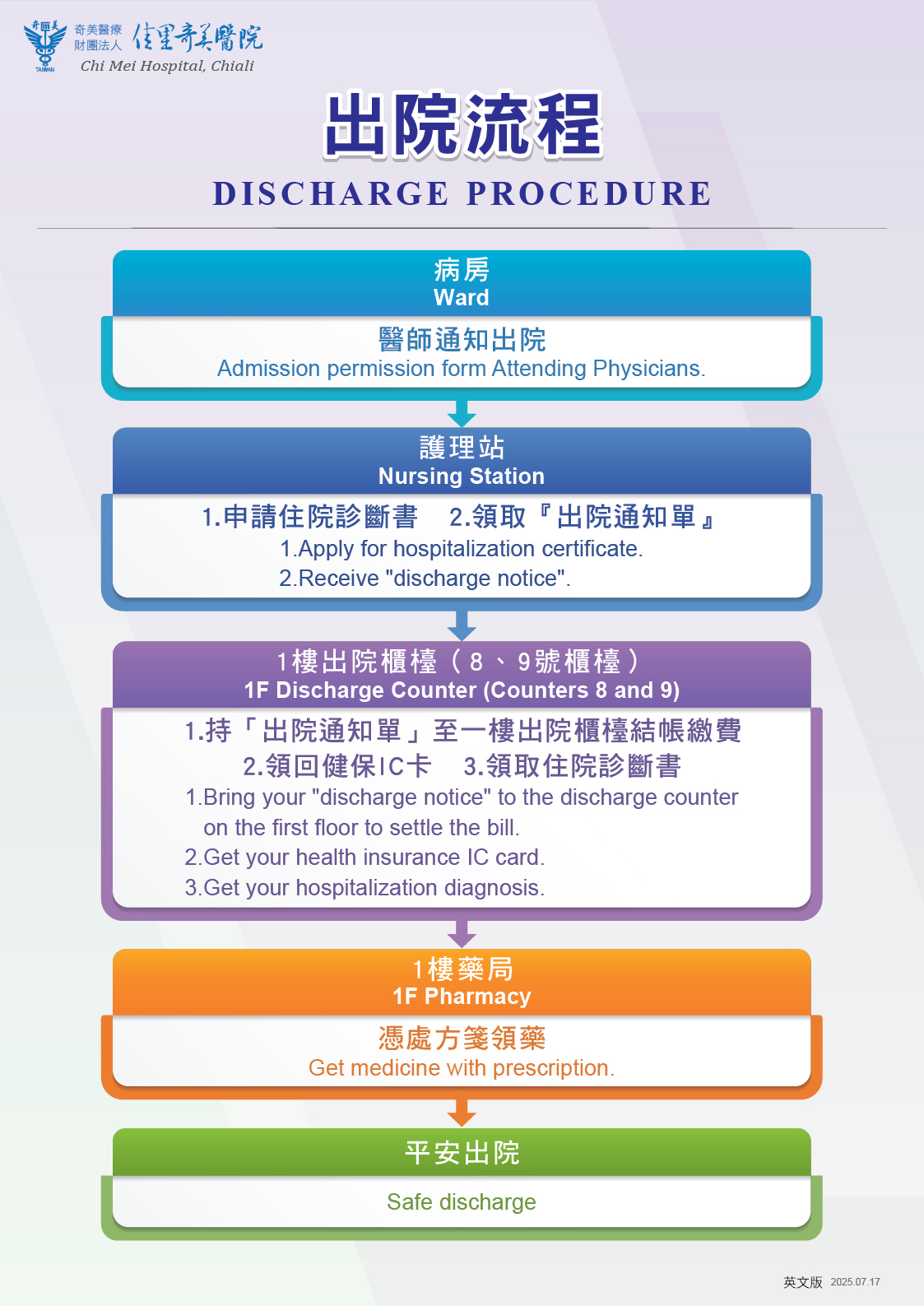
Other Services
- Telephone Service
-
- Each ward is equipped with a telephone (extension number: add "35" before the ward number). For example, to call ward 7002, please dial 35702.
- To make an external call from the ward (Tainan City only), please press "0" and wait for the "beep" sound before dialing the other party's phone number.
- Please contact each nursing station for nursing application.
- Our hospital provides special bedside hair washing service and ambulance service during hospitalization. Those who need it can inquire at the nursing station.
- f you have other valuable suggestions or feel that our services are not adequate, please report them directly to the head nurse. You can also submit a written complaint to the complaint box located in the central stairwell on the first floor of our hospital or call our complaint hotline: (06)726-3333 ext. 32920 or 32921.
- Please inform the medical staff in advance if you need a diagnosis certificate, examination report and discharge medical record summary, and the nurse will deliver it to the applicant. Please inform the nurse in advance of the above application information and diagnosis certificate to avoid delaying your discharge time.
- Please go to the Radiology Department on the first floor of the basement to apply for image copies with your patient ID.
- To protect your medical autonomy, our hospital provides all inpatients with "Advance Palliative Care Directive", "Do Not Resuscitate Consent", "Medical Agent Appointment" and "Advance Palliative Care Withdrawal Statement" so that doctors can respect the wishes of terminally ill patients who are incurable and not provide active treatment or emergency treatment, but only provide palliative and supportive medical care measures to alleviate or eliminate their pain. If necessary, the above documents can be obtained from the nursing stations on each floor or the service counter on the first floor.
- In order to turn limited life into unlimited love, our hospital provides all inpatients with an "Organ Donation Consent Form" in accordance with national health policies. This will serve as a guide for organ donation decisions and allow family members to fully understand the patient's wishes. If you need the above documents, you can obtain them at the nursing station on each floor or the service counter on the first floor.
- Our service telephone number:
You can call for consultation on weekdays
Morning: 08:00~12:00
Afternoon: 13:00~17:00 - Clinic hours and consultation services.
- Inpatient enquiries.
- Make an appointment.
- Provide consulting services, social welfare resource services, organ donation, and volunteer services.
- Assessment of social and psychological conditions, family problems, financial issues, and discharge expenses caused by the disease.
| Unit Name | Telephone | Service name, content |
|---|---|---|
| Service Desk | (06)726-3333 ext. 32111 |
|
| Department of Social Welfare | (06)726-3333 ext. 32133 or 32134 |
|
| Registration Hotline | (06)726-3333 (Specialist) | The appointment time is within 42 days of the consultation. |
| Drug consultation | (06)726-3333 ext. 33111-2 | Medication consultation for outpatients and inpatients. |
| Suggestion / complaint hotline (daytime) | (06)726-3333 ext. 32920 or 32921 | Public feedback |
| Referral Center | (06)726-3333 ext. 32119 | Referral, transfer, agency inspection, insurance response |
| Health Checkup Center | (06)726-3333 ext. 37520 | Health Checkup for the Public |
| Apply for long-term chronic home care hotline discharge preparation service |
(06)726-3333 ext. 33062 | Home care, follow-up care services and consultation |
| Hospitalization and Discharge Service Center | (06)726-3333 ext. 32302 or 32303 | Hospitalization and discharge services, diagnosis application |
| Photocopy medical records | (06)726-3333 ext. 32252 (daytime) 32251 (nighttime) | Medical record copy application |
Five things patients should know about medical safety
Our hospital encourages the public to take charge of their own health, actively participate in the medical process, trust and communicate with our medical staff, work together to improve patient safety, and remember the five medical safety tips when seeing a doctor.
- To ensure safe medication use: follow your doctor's instructions, do not take over-the-counter medicines at will, and understand the name, usage, effects, side effects, and precautions of the medicines you are using when you pick them up. If you have any problems, report them to your medical staff immediately.
- Develop a good habit of visiting the sick and seeking medical treatment.
- Wash hands before and after visiting patients, wear a mask when visiting patients, and reduce the number of visits.
- People with weak immune systems or suspected of being infected should not visit the sick, especially the elderly and children.
- Pay more attention to your own condition and think carefully about important decisions: take the initiative to participate in the medical process, ask the doctor questions about the surgery/examination, carefully inquire about the necessity, location, steps, risks and success rate of the surgery/examination, and sign the consent form after you are fully aware of it.
- Correct identification is essential
- When receiving any treatment, tell the medical staff and ask them to verify your name to ensure correct identification.
- Before surgery, cooperate with the doctor to "confirm" and "mark" the surgical site to ensure the safety of the surgery
- Preventing falls brings peace of mind
- First thing to know: If you have taken sleeping pills or feel dizzy or your blood pressure is unstable, you should sit on the edge of the bed before getting out of bed, and then have your family help you down.
- Second tip: If you need any help and no family members are around, please immediately notify the nursing staff with a red light.
- Tip 3: If the floor is wet, please inform the nurse to prevent accidental falls.
- Tip 4: Please store items in cabinets as much as possible to keep aisles open.
- Fifth tip: When the nurse has pulled up the bed rails, if you need to get out of bed, you should put the bed rails down first and never climb over.
- Sixth tip: When the patient you are caring for is agitated, restless, or unconscious, please pull up the bedrails and restrain the patient.
- Tip 7: If your clothes are too big, please change into suitable clothes.
- Tip 8: Wear non-slip shoes and never go barefoot.
- Tip 9: Keep the lights in the ward as bright as possible.
- Tip 10: If there is an emergency when using the toilet, please press the red light in the toilet to inform the nursing staff.
